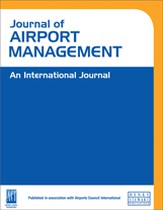How Sweden’s roadmap for fossil-free aviation paved the way for a more constructive dialogue regarding aviation and climate change
Abstract
Based on the decision by the parliament to make Sweden climate neutral by 2045, the governmental initiative Fossil Free Sweden has encouraged business sectors to draw up their own roadmaps as to how they will be fossil free while also increasing their competitiveness. The aviation sector in Sweden responded to this and was one of the first nine industries in Sweden to handover a roadmap to the Swedish government in 2018. After the roadmap was delivered to the government, a number of coordinated initiatives have been initiated both by the industry and by the government. It has in many parts contributed to a more constructive debate regarding aviation and climate change. The roadmap is based on two longterm goals. The first one is fossil-free domestic air traffic in Sweden 2030. This requires that approximately 15 per cent of all jet fuel in Sweden is replaced by fossil-free fuels. The other goal is that all aircraft taking off from Swedish airports will be fossil free in 2045. By focusing on a few key challenges and solutions where all involved parties could agree, it was possible to deliver a roadmap that seemed realistic and was broadly accepted. One finding in the roadmap is that a pragmatic and balanced approach between what is technically and commercially possible is needed. There are solutions that work today and where the basic efforts are will, courage, clarity and a working business model. If we dare venture into new solutions and learn from these ventures, we will probably reach much further than if we wait for the perfect solution. One example is Swedavia Airport’s decision to buy sustainable aviation fuel corresponding to the fuel demand for Swedavia’s own business trips. Swedavia made a procurement of this amount of fuel. The biofuel was purchased and delivered as a blend in the aviation fuel distribution system in Sweden. Last year, Swedavia made a joint procurement with three other companies. It was a very important step as it is not a traditional compensation but an actual reduction of emissions and something that can easily be copied by all companies and authorities in Sweden as well as in other countries. This paper will describe the process behind the roadmap for fossil-free aviation in Sweden and some of the initiatives that have evolved as a response to the roadmap.
The full article is available to subscribers to the journal.
Author's Biography
Henrik Littorin holds a degree of Master of Science in Business and Economics from Uppsala University in Sweden. Henrik has almost 20 years of experience from the aviation industry. At present, Henrik works as a consultant in a number of projects regarding the long-term decarbonisation of aviation in Sweden. Henrik has also been the acting Secretary General at the Swedish Air Transport Society and worked for almost 15 years as a Senior Analyst at Swedavia and LFV (the Swedish Civil Aviation Administration), responsible for analysis and communications regarding aviations’ climate impact, the socioeconomic effects of aviation, macroeconomic analysis, etc. Henrik was in charge of the work with the Swedish roadmap for fossil-free aviation in Sweden in 2045.
